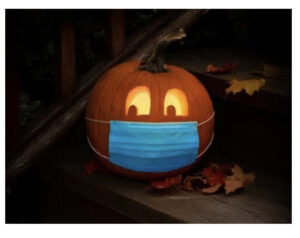
Fall has arrived and the countdown to Halloween has begun. Decorating pumpkins, picking out costumes, and getting special treats brings numerous kids joy during Halloween.
However, many Halloween traditions will look different this year due to the COVID-19 pandemic.
Many parents, kids and adults are left with one question: Is Halloween canceled this year?
“Many traditional Halloween activities can be high-risk for spreading viruses. There are several safer, alternative ways to participate in Halloween. If you may have COVID-19 or you may have been exposed to someone with COVID-19, you should not participate in in-person Halloween festivities and should not give out candy to trick-or-treaters,” according to the Centers for Disease Control and Prevention.
It’s clear that Halloween is going to look a little different this year. Touching candy from someone else’s house and bringing it to yours without knowing if they have the virus is a really big risk.
Also, you don’t want to be exposed to the virus while out trick or treating and touching different things, knocking on doors, going to a haunted house and being in a room with a crowd. Many traditional Halloween activities can be high-risk for spreading viruses.
According to the CDC, higher risk activities include, participating in traditional trick-or-treating where treats are handed to children who go door to door; having trunk-or-treat where treats are handed out from trunks of cars lined up in large parking lots; attending crowded costume parties held indoors; going to an indoor haunted house where people may be crowded together and screaming; and going on hayrides or tractor rides with people who are not in your household.
In some places like Los Angeles, trick-or-treating is not recommended at all after previously being banned, health officials said.
Children might not be able to go door to door and collect candy this year but it’s still possible for them to make some incredible memories on Oct. 31.
There are several safer, alternative ways to participate in Halloween that are lower risk activities, according to the CDC, “Carving or decorating pumpkins with members of your household and displaying them; decorating your house, apartment, or living space; having a virtual Halloween costume contest; having a Halloween movie night with people you live with; and scavenger hunt at home.
I think the best thing to say to friends and family is to go look at the CDC Halloween guidelines. They have general medical knowledge about what keeps you safe from catching the coronavirus from low risk, moderate risk and high risk.
The vast majority of 2020 has been altered by the COVID-19 pandemic, and the spookiest night of the year is probably going to be the same. Halloween may appear to be unique and many large events are being canceled. However, there are plenty of safe and protected, innovative ideas you can do.
Avoid activities that are higher risk for spreading the virus. Consider fun, creative alternatives that will lower the risk of spreading the virus that causes COVID-19.